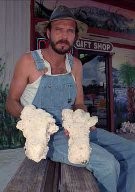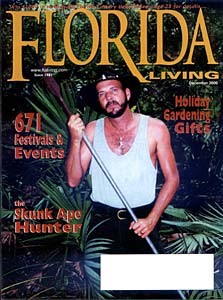
December 13, 2006
Just as I was curious about who coined “blobsquatch,” I’ve been wondering if there’s a clear history to who invented another term in our field.
Who coined the phrase “Skunk Ape”?
If you work your way over to the “Skunk Ape” entry at Wikipedia, you will find a simple answer that someone added there to that question. It is presented, as a fact, under the first subsection entitled simply Name. The following single sentence is given:
The term “skunk-ape” was coined by David Shealy who heads the Skunk-Ape Research Headquarters in Ochopee, Florida.
I’ve known the term “Skunk Ape” has been around a long time, and I sincerely couldn’t imagine that David Shealy would make such a claim. Therefore, I engaged in an exchange of emails with Shealy, and a survey of some old news articles I collected from my early “Skunk Ape” research days, to develop an understanding of this.

I started asking Shealy various questions about this subject in mid-November. Here’s David Shealy’s responsive replies:
It is very nice to hear from you. I will try to the best of my ability to answer the questions you have asked.
My birthdate is September 28, 1963. My first sighting of a Skunk Ape occurred when I was 10 years old while hunting with my brother Jack.
The term Skunk Ape has been used as far back as I can remember. When I was just a boy, most likely 7 or 8 years old a local man by the name of Raymond Wooten would visit our home for dinner. Many evenings the conversation topic was Skunk Apes. So it’s safe to say that the Skunk Ape name has been around for at least 35 years. I do not remember the exact dates of the Davie, Florida incidents where a Skunk Ape supposedly killed some cattle and was fired upon by the Florida Highway Patrol.
The producer of my DVD decided in editing to add the claim that my father coined the name Skunk Ape. Personally I did not feel right about his decision. I take my research very seriously and try not to embellish things unnecessarily. Although my DVD claims to be a documentary and is in many regards I can not honestly tell you my father coined the name Skunk Ape.
Just for the record, my DVD was produced free of charge by a very talented young man and I am very grateful for his contribution and the research dollars I have acquired from it’s sale. Thanks once again for your interest. If I can be of any further assistance please let me know. Keep up the good work.
The next day, I was sent another email from David.
I must tell you I felt a little uneasy last night after retiring to bed. I know I said that I can not honestly tell you that my father coined the name Skunk Ape however after sleeping on it I can not honestly tell you that he didn’t. I really don’t know.

One last email from Shealy, on December 11:
Sorry for the delay in my response. Our internet server is being updated and we are having some difficulties sending emails. Of course you have my permission to use the photo from Florida Living or any other photos or news reels. Thanks for your interest.
So, doing the math, Shealy saw his first Skunk Ape in about 1973; he thinks he first heard the term “Skunk Ape” in 1970 or 1971. Shealy shared openly and clearly about the issue and I thank him for his candid answers.
Wikipedia is wrong (as it happens to be, now and then), and it appears that Shealy never made any claims that he coined the name “Skunk Ape.”
I looked through my archives of articles which are mentioned in the bibliography to my paper “The Occurrence of Wild Apes in North America,” in The Sasquatch and Other Unknown Hominoids, edited by Vladimir Markotic and Grover Krantz (1984).
The series of sightings that rose to the level of national news in 1971, were already describing something being called “Skunk Ape,” but also with a little hint the name had to be explained, as if it was new. For example, the countrywide publication from Silver Springs, Maryland, the National Observer published the article, “Skunk Ape of the Everglades – A Giant Ape That Smells Bad,” on August 16, 1971. Other news items on the encounters and hunt for the Skunk Ape were published in August 1971, from Los Angeles’s Herald-Examiner to the Miami Herald.
Does anyone have earlier examples of the use of the moniker “Skunk Ape,” or know who may have coined the term?
About Loren Coleman
Loren Coleman is one of the world’s leading cryptozoologists, some say “the” leading living cryptozoologist. Certainly, he is acknowledged as the current living American researcher and writer who has most popularized cryptozoology in the late 20th and early 21st centuries.
Starting his fieldwork and investigations in 1960, after traveling and trekking extensively in pursuit of cryptozoological mysteries, Coleman began writing to share his experiences in 1969. An honorary member of Ivan T. Sanderson’s Society for the Investigation of the Unexplained in the 1970s, Coleman has been bestowed with similar honorary memberships of the North Idaho College Cryptozoology Club in 1983, and in subsequent years, that of the British Columbia Scientific Cryptozoology Club, CryptoSafari International, and other international organizations. He was also a Life Member and Benefactor of the International Society of Cryptozoology (now-defunct).
Loren Coleman’s daily blog, as a member of the Cryptomundo Team, served as an ongoing avenue of communication for the ever-growing body of cryptozoo news from 2005 through 2013. He returned as an infrequent contributor beginning Halloween week of 2015.
Coleman is the founder in 2003, and current director of the International Cryptozoology Museum in Portland, Maine.
Filed under Breaking News, Cryptomundo Exclusive, Cryptotourism, CryptoZoo News, Cryptozoologists, Cryptozoology, Media Appearances, Pop Culture, Skunk Apes, Swamp Monsters